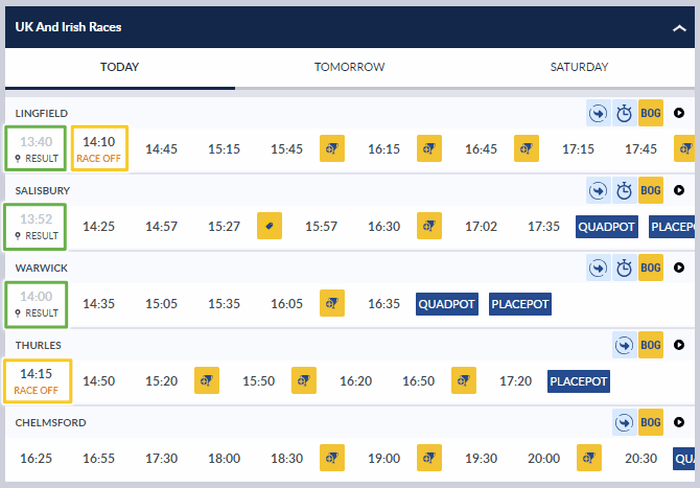 Whether you bet online, in the real world, or both, you will most likely have heard the term “Settled Bet” – be it via the Settled Bets section of your online account or being told, “You will have to wait for your bet to be settled before collecting” on the high street.
Whether you bet online, in the real world, or both, you will most likely have heard the term “Settled Bet” – be it via the Settled Bets section of your online account or being told, “You will have to wait for your bet to be settled before collecting” on the high street.
But what does this phrase mean? When do bets become settled? Are all settled bets final? Read on for answers to all of the above and more.
So, What is a Settled Bet?

A settled bet is a wager that the bookmaker has resolved once the official result is determined. This bet resolution will generally take one of three forms:
- Loser – Bookmaker keeps your stake
- Winner – Bookmaker adds any returns to your betting account or makes them available for collection at a betting shop.
- Void/push – Stake returned to your account
A settled bet is, therefore, any bet where the official outcome is known, and the bookmaker has taken the appropriate action to resolve – or settle – the bet. Prior to being settled, bets are referred to as Open/Unsettled, or Live if the event is currently in play.
When Is a Bet Settled?

Races highlighted above in green here have a settled result. Those in yellow have started but are awaiting settlement. The other races are yet to start
Bet settlement usually begins as soon as the official result of the sporting event is known. In football – and most other sports – this process will start as soon as the final whistle is blown, and generally takes a matter of minutes, or even seconds at the most efficient bookmakers.
The process takes slightly longer in horse racing due to the weighing-in system. Prior to any race, all jockeys must weigh out to ensure they are beginning the race carrying the correct weight, and then weigh in to confirm that they have completed the race carrying the allocated weight.
The settlement process will begin once the weighing in procedure is complete, and the official result announced. Most of the time, this causes no more than a minor delay, as the weighing-in process is usually over and done with within a few minutes of the runners crossing the line.
Much of the time bookies will settle bets not at the conclusion of the event, but rather once the result of the wager has been unconditionally determined. For example, with a game of football, should you make a bet on over 0.5 goals, as soon as the first goal of the game goes in, most betting sites will settle that market. If you backed under 0.5 goals, your bet will be a loser, whilst wagers on over 0.5 will win and relevant punters will have stake and winnings returned to their accounts.
Reasons for Bet Settlement Delays

In years gone by, all bets were settled manually by the bookmakers and understandably, this could be a slow process, especially on big events. These days, an automated computer system is commonly used – both online and in bricks-and-mortar betting shops. This digital method obviously speeds up the process considerably, and most of the time, your bet will be settled impressively quickly following the conclusion of an event.
However, there may be occasions when bet settlement is delayed. If you ever find yourself waiting a little longer, it will most likely be for one of the following reasons:
Stewards Enquiry
Following any horse race, a Stewards Enquiry into the result may be called. This may be instigated by the Stewards, or at the request of connections of a competing horse. Stewards Enquiries examine whether a runner improved their finishing position by interfering with another runner, weight discrepancies, runners taking the wrong course and certain other issues.
An enquiry may leave the result unaltered, or alternatively change the finishing positions if the offence is deemed sufficient. The official result will only be declared once this enquiry has been completed. This is rarely a very lengthy process, with Stewards Enquiries lasting longer than 15 minutes being a rarity.
One thing to note is that many bookmakers operate a First Past the Post or Double Result policy on horse racing. This policy means that the bookmaker will pay out on the Official Result AND the order in which the runners actually crossed the line. The most notable exceptions are in relation to incorrect weights and runners taking the wrong course, in which cases bookmakers will only pay out on the official result.
Photo Finish
In particularly close finishes, it may be nigh on impossible to call the result with the naked eye. Whenever this occurs, a photograph of the runners crossing the line is used to determine a winner. This process will inevitably cause a delay in your bet being settled. We are talking only a matter of minutes, as the modern digital prints – which can separate horses by a pixel – have made the process far quicker than the days of a steward sat with a microscope and a slide rule.
High Volume
Even computerised systems have their limits. During busy events – the Grand National being a prime example – slight technical issues may result in a settlement delay.
Foul Play
Finally, if the bookmaker gets even a whiff that there may be some form of skulduggery afoot – be that due to suspicious betting patterns, dubious behaviour by the participants, or otherwise – they may postpone the bet settlement process whilst an investigation is underway. This is the most likely scenario to result in a significant delay. If the bookmaker deems that the result has been fixed in any way, they may take the action of voiding all bets on the event under scrutiny.
Is a Settled Bet Final? What Happens if the Result Changes?

Results can be altered days or even weeks after bets have been settled for infringements such as failed drugs tests
Once a bookmaker has settled a bet, the decision is considered final and effectively the full stop at the end of the betting process. Even if the result is altered at a later date, you will not be asked to return your winnings. Examples include a horse racing result confirmed as official but later altered on appeal or an athlete who wins an event only to be disqualified due to a failed drugs test.
This final nature of settled bets is, of course, good news if you collect on a winner which is subsequently demoted or disqualified. The other side of the coin is that if you backed a selection which finishes second and is later promoted to first, you will not be paid out – unless as a goodwill gesture by the bookmaker.
Note that the above outlines the rules in place at the majority of big bookmakers in relation to a result being changed after the event. Rules may vary from company to company, so always be sure to consult the terms and conditions of your online bookmaker of choice.
Why is the Payout Not What I Expect?

Of course, the dream result when placing any bet is to watch your selection romp to glory, wait for your bet to be settled, and then sit back and admire your winnings. But what if these winnings aren’t quite what you expect? Always initially disappointing, there will usually be a perfectly legitimate reason for this – the most common of which are:
Dead Heat Rules
Whatever the sport, if your selection finishes in a Dead Heat, you will not be paid out in full. Say, for example, you place a £10 bet on Hot Shot Harry to win at 5/1 and watch on as your noble steed finishes in a dead heat with Deadly Dorris. If you log in to your account expecting a £60 payout, you will be sadly disappointed.
The reason for this is that, in finishing in a tie for first, Hot Shot Harry can be considered to have filled both the 1st and 2nd positions and, therefore, is really only worth half of a winner. In this situation, the bookmaker will divide your bet in two, settle half as a loser, and pay out the other half at the full odds, i.e., £30, in this instance. All betting sites use Dead Heat rules and they do not differ from one bookmaker to the next. Note that such rules can apply to horse racing, dog racing, certain top goalscorer bets in football and a range of other events. One area where they often come into play is with each way betting in golf, with ties for lower places common.
Rule 4
The ever-unpopular Rule 4 in horse racing exists to protect the bookmakers in the event that one or more horses withdraw after a bet is placed. Whenever a horse withdraws from a race, this will impact the winning chances of the remaining runners. As such, the odds must be altered, and a new market formed.
All new bets will be placed using these adjusted prices, whilst all bets placed before the formation of the new market will be subject to a Rule 4 deduction in order to bring the pre-withdrawal prices into line. This deduction is expressed as pence per pound and calculated on a sliding scale related to the odds of the withdrawn horse. The level of the Rule 4 deduction can range from a highly unpleasant 90p per £1 for a 1/9 or shorter favourite, to 5p per £1 for a 14/1 outsider. If the withdrawn runner is priced at odds of greater than 14/1, no Rule 4 deduction will apply.
What to do if My Bet Has Been Settled Incorrectly?

Most differences can be resolved or explained by customer services
Given the automated systems now in use, it is exceedingly rare for a bet to be settled incorrectly. Rare, but not completely unheard of. If, for whatever reason, you believe that your bet has been settled incorrectly, your first port of call should be to contact the bookmaker.
At the vast majority of sites this is quick and easy to do via email, telephone, or a live chat facility. Speaking to a Customer Service representative will usually resolve the issue – either via a correction, or a satisfactory explanation as to why the bet has been settled in the way it has. If you are still unhappy having spoken to the bookmaker, your next option is to contact the Independent Betting Adjudication Service, who are specialists in dealing with betting related disputes.
Settled Bets and Special Offers
Always check terms and conditions carefully for details such as qualifying periods
One final thing to be aware of with Settled Bets is their role in some Special Offers, e.g., Place 5x£10 bets between Monday and Friday to receive a £10 Free Bet. Contained within the terms and conditions of most of these deals there will often be a stipulation that the 5 x £10 qualifying bets must be both placed and settled within the qualifying period, i.e., Monday to Friday. This can lead to disappointment for those unaware of what “settled” means.
For example, a punter may place 4 x £10 bets on the midweek football – all of which have been settled by the end of Thursday evening. In order to claim the Bonus, they then place a final £10 bet on Friday afternoon, backing Newcastle United to win the Saturday evening fixture. However, although placed inside the qualifying window, the bet will not settle until the end of Saturday’s game and, therefore, will not count as a qualifying bet.
